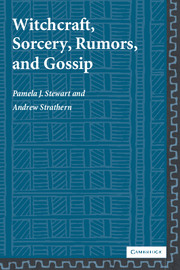1 - Witchcraft and Sorcery: Modes of Analysis
Published online by Cambridge University Press: 20 November 2009
Summary
In this chapter we give a brief overview of some predominant ways in which anthropologists have analyzed the phenomena of witchcraft and sorcery. We then proceed to give a preliminary idea of the kinds of discussions of materials that have emerged from these orientations in ethnographic terms. Some of these materials we also discuss below in more detail. In particular we juxtapose here case histories from Africa and from Europe, to which we devote separate chapters subsequently. Our overall aim in looking at the materials here and throughout the book is to place in the foreground the virtues of an analytical approach that is processual and links microprocesses to larger historical themes. Our particular contribution to analysis is to highlight the intrinsically important roles played by gossip and rumor in the genesis of conflict.
Definitions and Perspectives
Anthropologists and social historians have approached the topics of witchcraft and sorcery in different ways. Before we discuss these, we need to take note of the definitional issues at stake. Do we conflate witchcraft and sorcery as forms of “mystical power,” or do we attempt to make a clear distinction between them? In principle, as we note below, a distinction can be made between witchcraft as the expression of a malign power in a person's body and sorcery as the use of a magical craft or knowledge to harm or benefit others. Especially, what is labeled witchcraft is often seen as a consuming force. The witch eats the life power of the victim.
Information
- Type
- Chapter
- Information
- Witchcraft, Sorcery, Rumors and Gossip , pp. 1 - 28Publisher: Cambridge University PressPrint publication year: 2003
